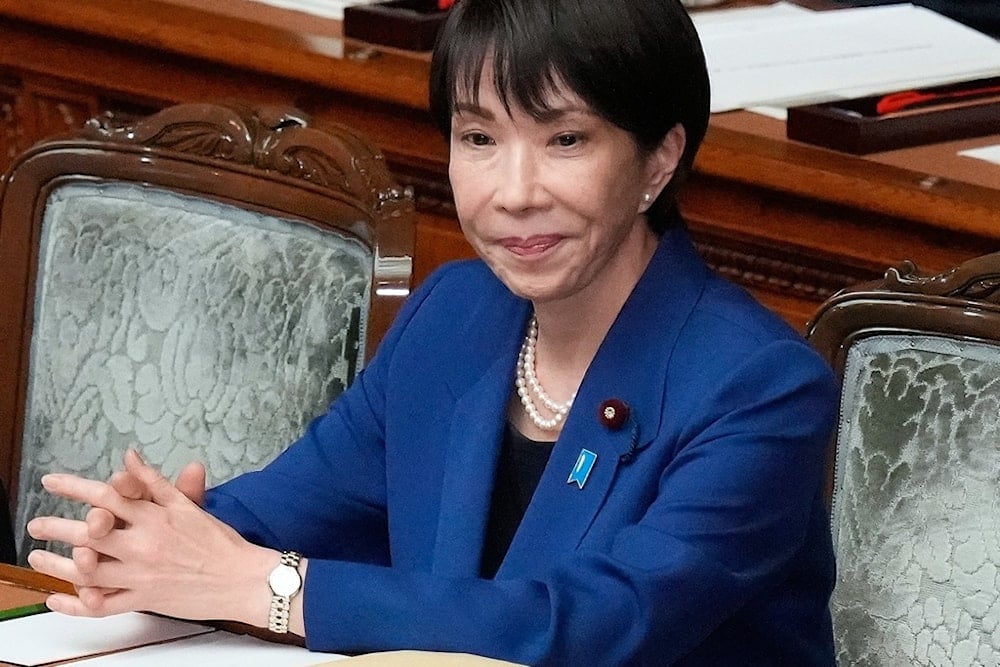Japan's new PM vows to deepen US alliance, accelerate defense spending
Japan's new Prime Minister Sanae Takaichi pledged to deepen the alliance with Washington, accelerate defense spending, and take a tougher stance on China and immigration.
-

Japan's Prime Minister Sanae Takaichi pauses after delivering a policy speech at the extraordinary session of parliament's lower house Friday, October 24, 2025, in Tokyo. (AP Photo/Eugene Hoshiko)
Japan's new Prime Minister Sanae Takaichi pledged to strengthen ties with Washington and push forward Tokyo's defense ambitions, while warning against growing security threats from neighboring powers.
Delivering her first policy address before a boisterous parliament on Friday, Takaichi said she would "elevate the Japan-US relationship to new heights" when she meets with President Donald Trump during his upcoming visit to Tokyo next week. She added that she aims to build "a relationship of trust" with Trump, signaling alignment with US calls for Japan to take on a greater security role.
In a major policy shift, Takaichi announced that Japan will achieve its target of allocating two percent of gross domestic product to defense spending by March 2026, bringing the deadline forward by two years. The decision fulfills a long-standing US demand that Tokyo expand its military budget to counter regional threats and reflects Takaichi's determination to solidify Japan's role within the US-led security framework.
Targeting China
A known China hawk, Takaichi warned lawmakers that "the military activities of neighbouring countries — China, [the DPRK] and Russia — have become a grave concern." She added that "the free, open and stable international order we have grown accustomed to is being profoundly shaken by historic shifts in the balance of power and intensifying geopolitical competition."
Her administration also plans to revise Japan's National Security Strategy by the end of 2026 to reflect these changes, citing the war in Ukraine and renewed instability in West Asia as examples of the shifting global order.
Takaichi has previously accused Beijing of treating Japan with contempt, saying "Japan is completely looked down on by China," and has called for closer cooperation with Taiwan to address "the security threat" posed by China. Her first days in office have reaffirmed that Tokyo will maintain a firm posture toward Beijing while deepening defense coordination with Washington.
Immigration and social cohesion
While her tough rhetoric focused on defense and sovereignty, Takaichi also addressed domestic concerns. She acknowledged that Japan's aging society and shrinking workforce require the help of foreign labor, but stressed that public unease over immigration must be addressed. "Some illegal activities and breaches of rules by certain foreigners have created situations where members of the public feel uneasy and perceive unfairness," she said, as quoted by the South China Morning Post. "While we draw a clear line from xenophobia, the government will respond resolutely to such acts."
She pledged stricter enforcement of immigration rules and signaled that her cabinet would examine sensitive issues such as foreign land acquisitions, echoing growing nationalist sentiment and pressure from the populist Sanseito party, which portrays immigration as a "silent invasion."
Read more: Japan births fall to lowest in 125 years
Tackling inflation and economic pressures
On the economic front, Takaichi faces mounting pressure over rising living costs. Official figures released Friday showed inflation climbed to 2.9 percent in September, with rice prices soaring nearly 50% year-on-year following poor harvests and panic-buying. She said her government is drafting an economic package to cushion the impact of inflation and would work closely with the Bank of Japan to achieve "inflation driven by wage growth, not by rising costs."
Takaichi's approval ratings remain high, with a Yomiuri Shimbun poll showing support for her new cabinet at 71 percent, one of the strongest starts for a Japanese leader in decades. Markets have reacted positively to her pro-growth stance, as she has long advocated for increased government spending and accommodative fiscal policy.
She reiterated that the Bank of Japan will retain independence over monetary decisions, even as the central bank gradually unwinds its ultra-loose stance. "What's most important is for the BOJ and government to coordinate policy and communicate closely," she said.
"Overall, the big picture continues to be that price pressures appear to be reasonably firm," Abhijit Surya of Capital Economics told AFP.
Read more: Japanese lawmakers urge government to recognize Palestine

 4 Min Read
4 Min Read









